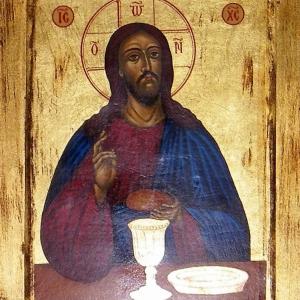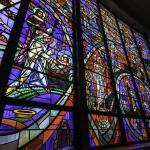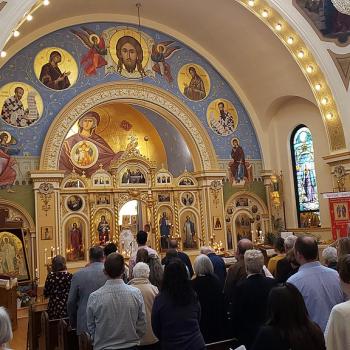
For the bread of God is that which comes down from heaven, and gives life to the world – John 6:33 RSV.
The bread of life not only gives us life, but preserves it too:
For in it all that is, all that was, all that will be is to be had.
How is this so? How can this remarkable fact be true?
Is it not crazy to believe this, have we become mad?
God created all things, God is found in all things,
God gives life, God preserves life, God is life.
God from God incarnate, the king of kings
Gives his all to all so all can be one without strife.
What is found in God? All that ever shall be:
What is found outside of God? Nothingness.
What is in this bread made God is all actuality.
How can there be any other otherness?
All that is, is one, in communion:
God, humanity, and all creation.
The Word brings such union:
He is its firm foundation.
Bread, wine, God:
One with the One:
We should be awed:
In the Son.
The eucharist, communion, is the bread of life. In it, we receive the prince of peace, the king of kings, the God-man, Jesus Christ. When we reflect upon Jesus, we learn he has two natures which are united and made one through his hypostasis or person.
When we receive Jesus, we receive all that he is: this is the incomprehensible truth of communion. We receive him in his humanity but also in his divinity. God is everywhere present and fills all things, indeed, God transcends all of creation in such a way all creation is contained within him. Wherever he is all that was, is, and ever shall be is present. This is why when he is received in communion, all things are received with him. We, a part of creation, receive our very selves from God when we partake of the eucharist, for we are in him, and so, by partaking of the bread of life, we receive the gift of ourselves, our true selves, that which God knows of us in his eternity.
The eucharist does not only bring us into contact with our true selves, with the person known by God in his eternity, but also, it brings us into contact with and receive everyone else and everything else at the same time, because they are all found within God. This helps us understand the relationship between the eucharist and communion. For we take in all things unto ourselves through the bread of life; to do so, we must open ourselves up to them, to give them space within ourselves. As we partake of communion, as we partake of Jesus, we find ourselves one with all things. Just as food becomes a part of us after we eat it, so, when we receive communion, all things become, as it were, food for our soul: we not only partake of them, but they become a part of us, even as we likewise, find ourselves being taken in and received by others when they receive communion.
This is one of the great mysteries of communion. Creation partakes of itself as it partakes of the God which transcends it. How is this possible? Communion shows us the recursive nature of creation; it is only in and with God, receiving itself with God, does it find itself sustained, for in receiving itself through communion, creation has received itself infinitely. When creation receives itself, it receives itself in receiving itself, and therefore, receives itself in receiving itself in receiving itself, and likewise onto infinity. Creation is made greater as it find itself receiving itself in such an infinite recursion, a recursion which is founded upon and dependent upon God and his willingness to give of himself to us in communion.
In the eucharist, in communion, therefore, we have the God-man; in and through his divinity, all things are shown to be one, contained within the space given to it within the divine life itself, even as they are all contained, mysteriously, sacramentally, in the species of bread and wine. The eucharist shows us truly God is indeed all in all, giving himself to all, having all things interdependent with each other as they receive each other and themselves through their reception of God. When we contemplate the eucharist correctly, we should be able to perceive that being itself is communion, and without communion, the vitality of being is lost. The eucharist truly is the bread of life; it binds and ties all things together so that through it, they can and will have life together as one in God.
Stay in touch! Like A Little Bit of Nothing on Facebook.
If you liked what you read, please consider sharing it with your friends and family!













